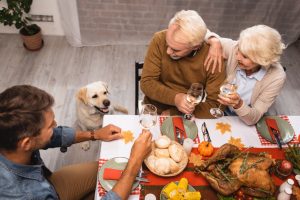 Thanksgiving Pet Safety Tips
Thanksgiving Pet Safety Tips
The end of the year brings with it many holidays, special gatherings, and parties with amazing food, but it also can come with a few potential hazards for pets. Ultimately, it’s really important that holiday food items are kept away from pets, and that pet owners who travel make careful arrangements for safe transport, make boarding accommodations for them, or make arrangements for them to be properly cared for at home. Follow these Thanksgiving pet safety tips from Longwood Veterinary Center to keep your pets healthy and safe during this upcoming holiday season, so you can eat, drink, and be merry.
Know What’s Toxic for Pets
It might be the time of year for overindulging in all the tasty foods, but that isn’t a good idea for your pet. Fatty foods are difficult for pets to digest, and poultry bones can actually damage your pet’s digestive tract. Also, many holiday sweets can contain ingredients that are poisonous to animals. So it’s better to be safe than sorry.
No Ma’am, No Ham, No Turkey
In other words, keep the food ON the table. Did you know that for pets, eating even a small amount of turkey or turkey skin can cause pancreatitis, which is a life-threatening condition in pets? Lots of foods that may be included in the holiday spread can be toxic to pets, such as raisins, grapes, and onions. If you want to treat your pet to a special holiday feast, make sure to pick up treats that are actually made and intended for pets.
Desserts are for People
Most people are aware that chocolate can be harmful for pets, but even the artificial sweetener, xylitol, which can be found in a lot of “sugar-free” sweets and baked goods, can be deadly to both dogs and cats. However tempting it may be to share with your furry BFF, please don’t.
Keep Trash Out of Reach
It’s also important not to leave the turkey remnants unaccounted for on the dinner table, or even in a trash can that your pet could access. Make sure to dispose of the turkey carcass, bones, anything used to wrap or tie up the meat, bags, strings, and packaging- the whole nine yards. Trash these items in a covered receptacle that your pet can’t access in order to keep him safe.
Guard the Plants
 Don’t forget that many flowers and festive plants are also toxic to pets. Amaryllis, Baby’s Breath, Sweet William, hydrangeas, some ferns, and more are toxic to animals, and should be kept well out of reach if you have them in your home at all. The popular holiday poinsettia is also mildly toxic if ingested. Of course, the ASPCA has a full list of items to be aware of for both dogs and cats, so check them over to ensure your holiday decorations don’t pose any potential threats to your pets.
Don’t forget that many flowers and festive plants are also toxic to pets. Amaryllis, Baby’s Breath, Sweet William, hydrangeas, some ferns, and more are toxic to animals, and should be kept well out of reach if you have them in your home at all. The popular holiday poinsettia is also mildly toxic if ingested. Of course, the ASPCA has a full list of items to be aware of for both dogs and cats, so check them over to ensure your holiday decorations don’t pose any potential threats to your pets.
If you think your pet has eaten something it shouldn’t have, call your Longwood Veterinarian immediately, or try the ASPCA Poison Control Hotline at 888.426.4435.
Happy Howlidays!
Our team at Longwood hopes you have the best holiday season with your family, friends, and pets, and we hope these Thanksgiving pet safety tips help keep your animals safe and happy throughout the chaotic holiday season. And of course, contact our team with any concerns about your pet. We’re here if you need us!
